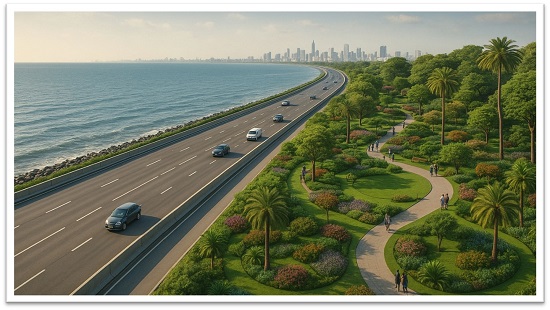
Mumbai’s Coastal Road Set For Green Transformation: Reliance Industries Shortlists Six Global Architecture Firms For Iconic Waterfront Gardens
Mumbai’s ambitious Coastal Road project, already hailed as one of India’s most significant urban infrastructure achievements, is now preparing for its next transformation, from concrete corridor to coastal paradise. Reliance Industries Ltd (RIL) has shortlisted six globally renowned architecture and landscape design firms to reimagine 53 hectares (130 acres) of reclaimed land along the stretch between Priyadarshini Park and Worli.
The initiative, aptly titled ‘Coastal Road Gardens’, is part of RIL’s Corporate Social Responsibility (CSR) commitment and promises to blend ecology, design, and urban innovation. The shortlisted firms, hailing from the Netherlands, Europe, South Korea, North Korea, and the United States, will compete to turn the Mumbai coastline into one of the world’s most scenic public spaces.
Among them, Cozy Designs from the Netherlands was introduced to civic officials last week, along with other contenders. Each firm will now present conceptual designs to a special committee formed by the Brihanmumbai Municipal Corporation (BMC). Once approved, the winning design will set the stage for construction to begin shortly after Diwali.
The evolution of Mumbai’s Coastal Road: From infrastructure to inspiration
Nearly a year after the Coastal Road opened to traffic, the project continues to redefine Mumbai’s relationship with its coastline. What was once a traffic relief initiative is now evolving into a global case study in integrated urban design, one where transport, recreation, and sustainability coexist seamlessly.
The 53-hectare redevelopment is envisioned as a network of landscaped gardens, cycling and walking tracks, recreational plazas, and interactive green spaces supported by energy-efficient lighting systems. The goal is simple yet ambitious, to create a waterfront that balances aesthetic appeal with environmental integrity.
A senior official from the BMC’s Coastal Road Department confirmed that the project has reached the agreement stage. “Fifteen architects were initially invited, and six have been shortlisted based on their experience, creativity, and manpower capacity. Concept designs will be submitted for review before Diwali, and the final selection will follow soon after,” the official stated.
Governance and collaboration: A model of civic partnership
To ensure transparency and accountability, the BMC has constituted a dedicated landscaping committee chaired by the Deputy Municipal Commissioner (Gardens). The panel includes senior officials such as the Chief Engineer (Coastal Road), Chief Municipal Architect, and Assistant Commissioners from G South and D Wards.
This committee will oversee RIL’s design submissions, coordinate inter-departmental approvals, and monitor project execution to ensure the gardens meet international standards. The structured governance model exemplifies Mumbai’s shift toward outcome-based urban management, where public institutions and private enterprises work in sync.
CSR-driven urban innovation: RIL’s commitment beyond construction
What distinguishes this project is not merely the scale of investment but its long-term vision. Under its CSR framework, RIL has pledged not just to develop but also to maintain the landscaped areas for the next 30 years. This long-term stewardship ensures sustained upkeep, ecological balance, and a consistent visitor experience.
Initially, the BMC had planned to execute the project independently. However, with costs estimated at nearly ₹400 crore, private collaboration became a practical necessity. Among all applicants responding to the Expression of Interest (EoI), RIL was the only firm that met every technical and financial criterion, making it the natural choice for execution.
This partnership underscores a broader trend, India’s private sector stepping up to shape public infrastructure that serves both purpose and people.
Redefining Mumbai’s urban identity through design
The Coastal Road Gardens project is expected to elevate Mumbai’s global standing as a coastal megacity that embraces sustainability and aesthetics. The design blueprint emphasizes walkability, inclusive public spaces, and smart lighting systems that reduce energy consumption.
Beyond beautification, the initiative seeks to restore Mumbai’s lost connection with its waterfront, offering citizens a new kind of urban breathing space. For decades, the city’s shoreline has been dominated by industrial and transport infrastructure. This project reclaims that narrative, turning the seafront into a public asset for leisure, fitness, and cultural exchange.
Measurable impact: From travel time to quality of life
Since its operational launch in August 2025, the Mumbai Coastal Road has already delivered tangible benefits, significantly reducing travel time, fuel consumption, and vehicular congestion. The upcoming landscaping phase adds a new dimension of public utility and environmental consciousness.
By converting reclaimed land into green zones, the city not only enhances its aesthetics but also strengthens climate resilience. Green buffers, coastal vegetation, and tree-lined walkways will play a crucial role in reducing urban heat, improving air quality, and managing stormwater runoff.
The initiative reinforces the philosophy that urban infrastructure is not just about movement, it’s about meaning. When design meets purpose, the result is a city that not only functions efficiently but also feels alive.
A vision of Mumbai’s future: Green, global, and grounded
Reliance Industries’ role in the Coastal Road Gardens project represents a larger narrative in India’s developmental journey, the growing synergy between corporate capability and civic vision. For Mumbai, this collaboration is a sign of maturity, a city that’s learning to integrate progress with preservation.
As the final design selection nears, anticipation grows among civic planners, environmentalists, and citizens alike. The project stands as a reminder that infrastructure, when imagined responsibly, can become an instrument of transformation, one that inspires, not just operates.
Once construction begins post-approval, Mumbai’s coastline will not only redefine its skyline but also its spirit, symbolizing what modern India stands for, ambition guided by awareness, and growth rooted in sustainability.





